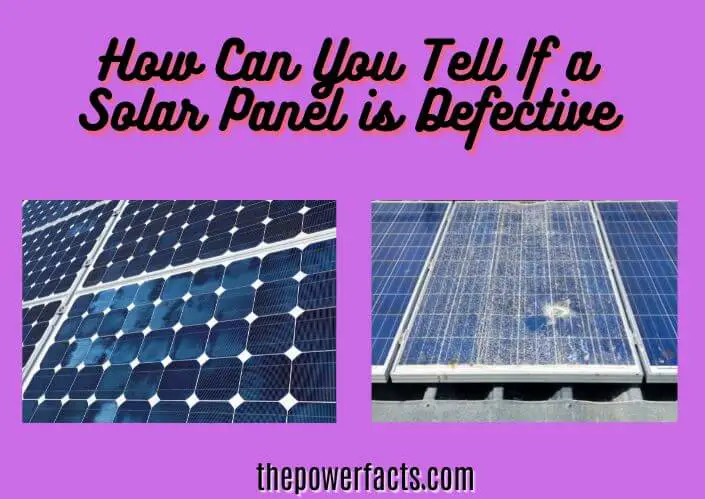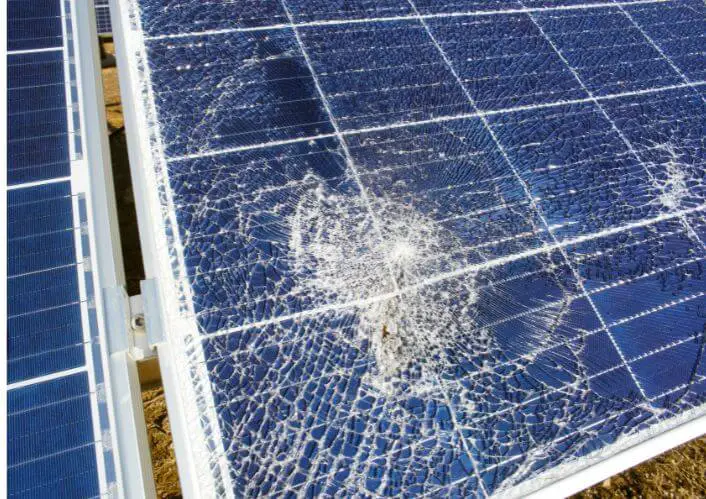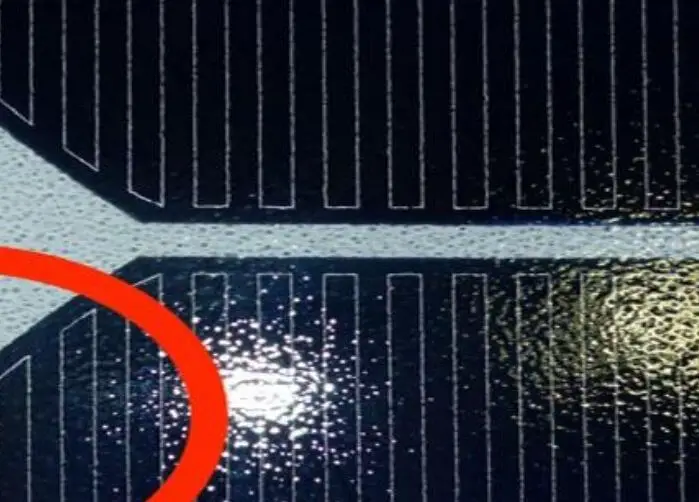If you have a solar panel, it is important to know how to tell if it is defective. There are a few things that you can look for to see if your solar panel is not working properly. First, check to see if the panel is receiving direct sunlight.

If the panel is in an area that is shaded, it will not work as efficiently. Also, check the connections to make sure they are tight and secure. Loose connections can cause the panel to malfunction.
Finally, check the output of the panel with a multimeter. If the output is low, this could indicate a problem with the solar cells.
You can usually tell if a solar panel is defective by its appearance. If the panel is cracked, discolored, or otherwise damaged, it is likely defective. Another way to tell if a solar panel is defective is by testing it with a multimeter.
If the panel does not produce the correct amount of voltage, it is likely defective.
Common Solar Panel Problems
Solar panels are a great way to save money and energy, but there are a few common problems that can occur. Here are some of the most common solar panel problems and how to fix them.
| Dirty Solar Panels | One of the most common problems with solar panels is that they can get very dirty, which reduces their efficiency. Dirty solar panels can still generate electricity, but the amount of power they produce will be reduced. Solar panels are more efficient when clean. You should clean your solar panels at least once a year to remove any dirt, dust, or debris that might be blocking the sun from reaching the panel’s surface. |
| Damaged Solar Panels | Another common problem is damage to the solar panels themselves. This can happen if hail or strong winds hit the panels, or if tree branches fall on them. If you live in an area with severe weather conditions, it’s important to have your insurance policy cover damage to your solar panels. |
| Inverter Problems | The inverter is what converts the DC power from the solar panel into AC power that can be used by your home’s appliances and electronics. If there is a problem with the inverter, it can cause your solar system to produce less electricity than it should. |
Inverter problems are usually covered by warranty, so be sure to check with your manufacturer if you think you have an issue.
Solar Panel Defect Detection

As the solar industry continues to grow, so does the need for efficient and reliable methods of solar panel defect detection. Currently, visual inspection is the most common form of quality control for solar panels. However, this method is often unreliable, as it can be difficult to spot defects with the naked eye.
Infrared thermography is a promising technique that can be used for the early detection of defects in solar panels. This technology works by detecting subtle changes in temperature across a surface. By comparing these temperature changes to a known good reference panel, it is possible to identify areas of potential damage or degradation.
A thermographic inspection is non-destructive and can be performed quickly and easily on large numbers of panels. It is also an effective tool for monitoring the long-term performance of PV systems, as it can detect changes in thermal behavior over time. With the increasing use of thermography for quality control in the solar industry, there is a growing need for qualified thermographers who are trained in identifying potential defects in PV systems.
If you are interested in pursuing a career in this field, consider taking our online course on Solar Panel Defect Detection with Infrared Thermography!
What Happens If One Solar Panel Fails?
In a typical solar panel system, each individual panel is connected in series to the others. This means that if one panel fails, the current will no longer be able to flow through it and the entire system will be disabled. While this may seem like a serious problem, there are actually several measures that can be taken to prevent it from happening.
Most importantly, each solar panel should have its own fuse. There are a few things to consider when selecting the size of fuse for your solar panels. This way, if one panel does fail, the rest of the system will still be operational. Additionally, most solar panels are designed with built-in redundancy, meaning that even if one cell within a panel fails, the others can continue to produce power.
Of course, no system is perfect and there is always the possibility that something could go wrong. That’s why it’s important to have a professional install your solar panels and perform regular maintenance checks. By doing so, you can ensure that your system will continue to run smoothly for years to come.
How to Check If Solar Panel is Charging Battery?
Solar panels are a great way to reduce your carbon footprint and save on energy bills. But, if you’re not careful, they can also damage your home’s electrical system. Here’s how to check if your solar panel is charging your battery correctly.
| First | Make sure that the solar panel is receiving direct sunlight. If it’s not, then it won’t be able to generate enough power to charge the battery. Solar panels can charge without direct sunlight, but they are not as efficient as when they are in direct sunlight. |
| Next | Check the connections between the solar panel and the battery. Make sure that they’re tight and secure. Loose connections can cause sparks that could damage the electrical system. |
| Finally | Check the voltage of the solar panel with a voltmeter. It should be around 18 volts for most systems. If it’s lower than that, then there could be a problem with the panel itself or with the battery connections. |
How to Ruin a Solar Panel?
If you’re looking to ruin a solar panel, there are a few things you can do.
First: you can physically damage the panel. This can be done by breaking the glass or puncturing the cells.
Second: you can block the sun from reaching the panel with something opaque like a tarp or a piece of cardboard.
Third: you can overload the panel with too much power, causing it to burn out.
Finally: you can simply let the panel sit in storage for too long without using it; over time, it will degrade and become less effective.
How Do You Check Solar Panels?
Solar panels are an increasingly popular way to generate electricity, either for your home or business. But how do you know if they’re working properly? Here’s a quick guide on how to check solar panels.
First, take a look at the physical condition of the panels themselves. Are there any cracks, chips, or other damage that could affect their performance? If so, you’ll need to get them repaired or replaced.
Next, check the electrical connections between the panels and the rest of your system. Make sure all the cables are securely attached and there are no loose wires. Finally, have a look at your solar panel system’s inverter.
This is what converts the DC power from the panels into usable AC power for your home or business. If it’s not working properly, it could be affecting the performance of your entire system. If everything looks good physically and electrically, then it’s time to check the output of your solar panels with a meter.
This will tell you how much electricity they’re actually generating. Compare this to your previous bills to see if there has been any change in production – if so, congratulations, your solar panels are working well!
How to Reset Solar Panels?
If your solar panels aren’t working properly, it might be time to reset them. Here’s how to do it:
1. First, check the manual that came with your solar panel system. There may be specific instructions on how to reset your system.
2. If you can’t find the manual or if there are no specific instructions, you can try resetting the panels by disconnecting and then reconnecting the power source. This could be a battery, an inverter, or even the utility grid.
3. Once you’ve disconnected and reconnected the power source, check to see if the solar panels are now working properly. If they are, great! If not, you may need to contact a professional for help troubleshooting the problem.
Solar Panel Low Voltage Problem
If you have a solar panel system installed at your home or business, you may occasionally run into problems with low voltage. This can be caused by a variety of factors, including bad weather, shading from trees or buildings, and faulty equipment.
If you suspect that you have a solar panel low voltage problem, the first thing to do is check your equipment.
Make sure that all of your panels are in good working order and that there is no damage to any of the wiring. If everything looks good, then the next step is to check for shading. If there is anything blocking the sun from reaching your panels (such as trees or buildings), then this can cause problems with low voltage.
Once you’ve ruled out equipment and shading issues, the next step is to check the weather forecast. If bad weather is on the way (such as a storm), then this can also lead to low solar panel voltages. In most cases, these problems will resolve themselves once the weather clears up.
However, if you’re still having trouble after checking all of these things, then it’s time to call in a professional. Solar panel experts can help identify the root cause of your problem and find a solution so that you can get back to generating power efficiently!

FAQs
How Do I Know If My Solar Panels are Faulty?
If you have a solar panel system and are concerned that it may not be working properly, there are a few things you can check. First, take a look at your energy bills. If you see that your energy usage has increased significantly, this could be a sign that your solar panels are not functioning as they should.
Another way to tell if your solar panels are not working correctly is to check the physical condition of the panels themselves. If you notice any damage or discoloration on the panels, this could indicate a problem. Finally, you can contact a solar panel technician to come and inspect your system to see if there are any issues that need to be addressed.
Can a Solar Panel Be Defective?
Solar panels are designed to withstand the elements and provide years of trouble-free service. However, like any manufactured product, they can occasionally be defective. The most common type of solar panel defect is called “hot spots.”
Hot spots occur when there is an electrical malfunction within the panel that causes a localized area to overheat. This can damage the panel and reduce its power output. If you suspect your solar panel has developed a hot spot, you should contact the manufacturer or a qualified solar installer for further diagnosis and repairs.
In some cases, hot spots can be repaired; in others, the entire panel will need to be replaced. Other less common types of defects include cracked glass, delamination (peeling) of the layers of material that make up the panel, and broken solder joints. These defects can also reduce the power output of the panel and may require replacement.
If you have a solar panel that isn’t working as well as it should, don’t hesitate to contact the manufacturer or a qualified installer for help. With proper care and maintenance, your solar panels should provide years of clean, renewable energy!
How Do I Know If a Solar Panel is of Good Quality?
If you’re considering solar panels for your home, it’s important to make sure you’re getting a good quality product. Here are a few things to look for:
1. Certification from a reputable organization: Solar panels should be certified by an independent organization like UL or IEC. This ensures that the panels meet safety and performance standards.
2. High efficiency: Look for panels with a high conversion efficiency, which is the percentage of sunlight that is converted into electricity. The higher the efficiency, the more power you’ll get from the panel.
3. Robust construction: Make sure the panel is well-built and can withstand harsh weather conditions. The frame should be made of durable materials like aluminum or stainless steel, and the glass should be tempered to resist breakage.
Will a Solar Panel Work If the Glass is Cracked?
A solar panel typically contains a layer of silicon, which is a material that easily absorbs sunlight. When the sunlight hits the silicon, it causes the electrons in the silicon to become energized and move around. This movement creates an electric current that can be harnessed to power appliances or lights.
However, if the glass on a solar panel is cracked, it will not work properly. The crack will allow some of the sunlight to escape instead of being absorbed by the silicon. This means that there will be less light hitting the silicon, and as a result, less electricity will be produced.
Conclusion
If you’re thinking about switching to solar power, it’s important to know how to tell if a solar panel is defective. Solar panels are a substantial investment, so you’ll want to make sure you get your money’s worth. Here are a few things to look for:
1. Check the warranty.
Most solar panels come with a 25-year warranty, so if yours is defective, you should be able to get a replacement or repair it at no cost.
2. Look for cracks or damaged cells.
If you see any physical damage to the panel, it’s likely that it’s not working as efficiently as it should be.
3. Monitor your energy usage.
If you notice that your energy bills have gone up even though you’re using the same amount of electricity, it could be due to a faulty solar panel.